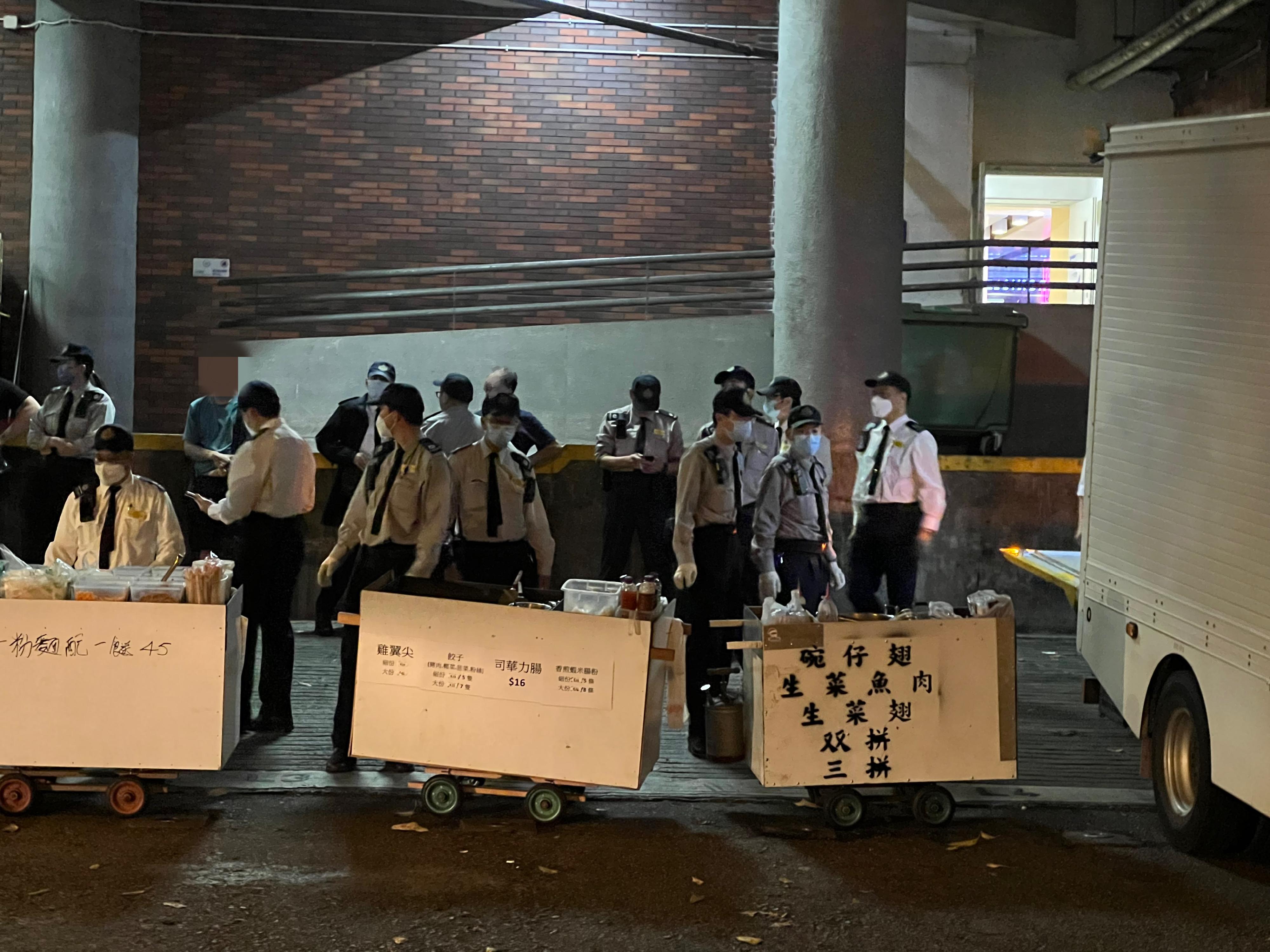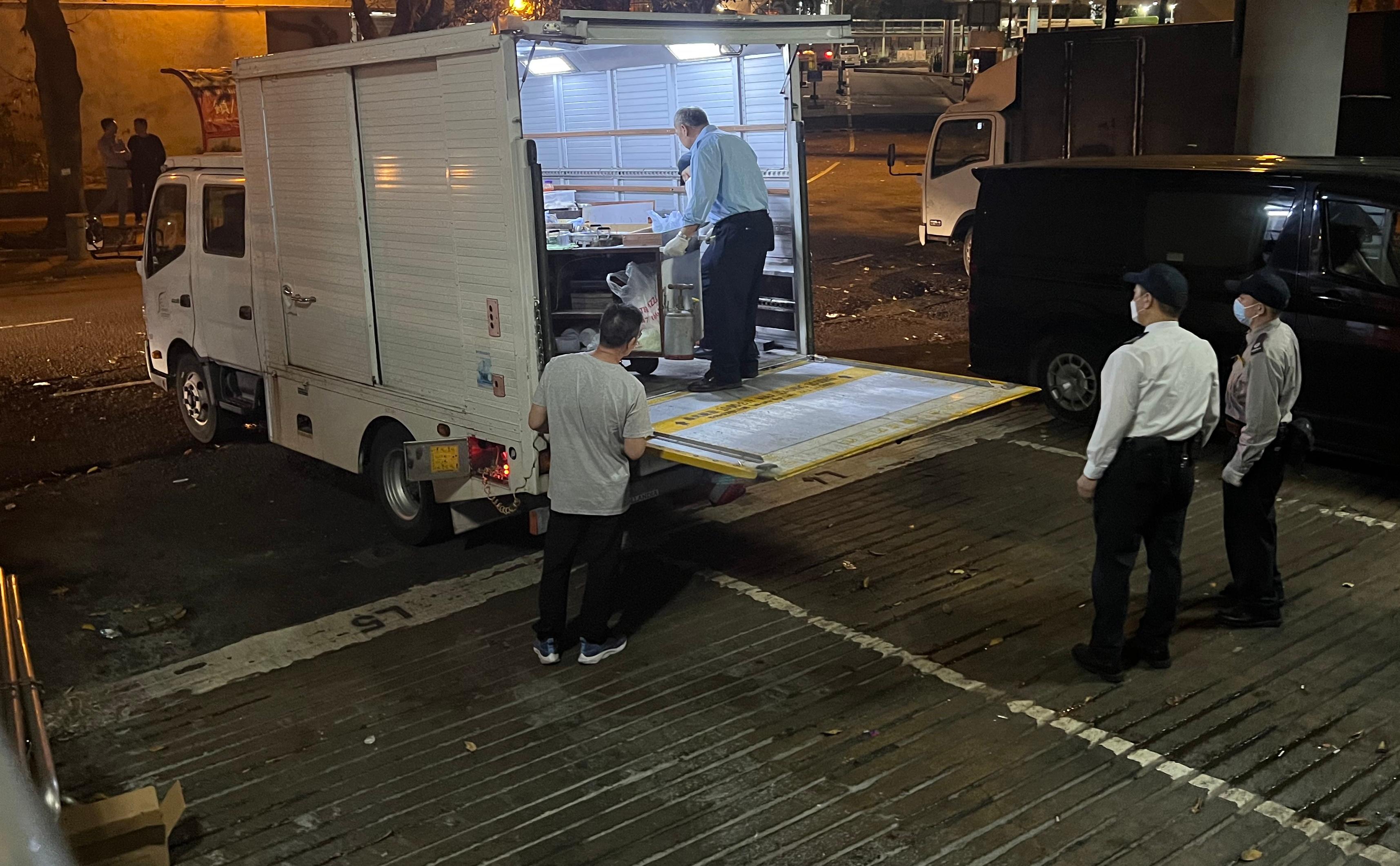A spokesman for the Food and Environmental Hygiene Department (FEHD) said today (February 23) that in order to improve the efficiency of evidence collection and to reduce the safety risks to passers-by and law enforcement officers, the FEHD piloted a new enforcement strategy led by video evidence collection in the Yuen Long District, so as to effectively combat unlicensed cooked food hawking activities.
The FEHD conducted a pilot enforcement operation codenamed "Nighthawk" against suspected organised unlicensed cooked food hawking activities in the area of Tin Yiu Estate in Tin Shui Wai for two consecutive nights on February 21 and 22, where officers used video recording devices to record illegal acts and information thereat as part of the evidence. Since 2023, the FEHD has recorded 39 complaints in relation to illegal hawking activities at the location. During the operation, the FEHD arrested five persons including four males and one female, aged between 42 and 58, and initiated prosecution against them for illegal hawking and causing obstruction in public place as well as cooking or heating food for the purpose of hawking without a valid licence. Six cooked food trolleys with relevant equipment were seized and about 172 kilograms of food involved were immediately destroyed.
The spokesman added that the new enforcement strategy could assist frontline staff to collect evidence more effectively, enabling the enforcement officers to arrest the hawkers based on the video evidence even after the offenders have left the scene. This could help avoid confrontations or chaotic situations, minimising risks to passers-by and law enforcement officers, as well as enhancing the effectiveness in curbing unlicensed cooked food hawking activities.
The spokesman emphasised that since the seized food trolleys were extremely dirty, the source of the seized food was unknown and could be prepared in an substandard environment with poor hygiene conditions, the food could easily be contaminated by unclean utensils and harmful microorganisms, posing a threat to food safety and public health.
According to the Public Health and Municipal Services Ordinance (Cap. 132), no person shall hawk in any street unless he or she holds a valid hawker licence issued by the FEHD. Offenders can be prosecuted and are liable to a maximum penalty of a fine of $5,000 and one month's imprisonment for a first conviction, and a fine of $10,000 and six months' imprisonment for a subsequent conviction. In addition, according to the Hawker Regulation (Cap. 132AI), no person shall, for the purpose of hawking, cook or heat any food or have in his or her possession any cooking stove or heating apparatus intended for cooking or heating food unless he or she holds a licence for operating a cooked food service. Offenders can be prosecuted and are liable to a maximum penalty of a fine of $5,000 and three months' imprisonment for a first conviction, and a fine of $10,000 and six months' imprisonment for a subsequent conviction. If unlicensed hawking activities obstruct passageways, law enforcement officers may institute additional prosecutions against offenders who cause obstruction by placing articles in public places under the Summary Offences Ordinance (Cap. 228). Offenders are liable to a fine of $25,000 or imprisonment for three months upon conviction.
The spokesman stressed that the FEHD will combat unlicensed cooked food hawking activities on an ongoing basis in order to safeguard public health and food safety. The spokesman also reminded members of the public to pay attention to food safety, not to gather and patronise unlicensed cooked food hawkers, and should not take the risk lightly. Having regard to the satisfactory results of the pilot enforcement operation, the FEHD will consider applying the new enforcement strategy to other districts, so to strengthen environmental hygiene-related enforcement work and to consolidate the improvements achieved in environmental hygiene.
Follow this news feed: East Asia







